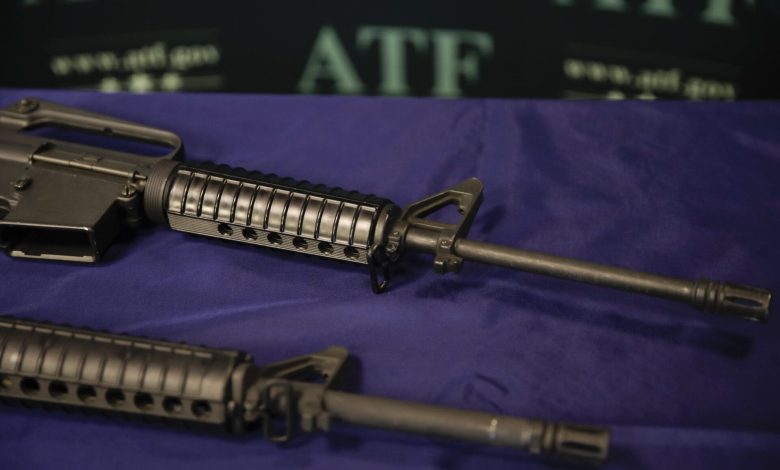Attorneys General File Supreme Court Brief To Limit The ATF

A coalition of 27 state Attorneys General has filed an amicus brief with the United States Supreme Court urging Justices to limit the Biden Administration’s ban on “ghost guns” through a “Frame or Receiver” rule proposed by the Bureau of Alcohol, Tobacco, Firearms and Explosives (ATF). The brief suggests, at best, that the ATF has overstepped its authority, and at worst that the agency is intentionally cooperating with the Biden Administration to evade the law by circumventing the legislative process. While the subject of the brief focuses on the proposed 2022 rule, broadening the definition of a “firearm” to include parts and parts kits that can be assembled into a functional firearm as well as partially complete, disassembled, or nonfunctional frames or receivers, the filing cites multiple examples outlining the overall unrestrained behavior of the ATF in recent years, including the failed overreach on bump stocks and stabilizing braces.
In July 2023, Judge Reed O’Connor of the Texas-based U.S. District Court ruled that the ATF had overstepped Congress with the proposed “Frame or Receiver” rule by banning partially made guns, effectively classifying certain parts themselves as firearms. Following the ruling, the Biden administration requested the Supreme Court intervene after the 5th Circuit Court of Appeals declined to put O’Connor’s ruling on hold. In a 5-4 vote last August, the justices granted the Biden Administration’s request to temporarily allow the rule to stand while the challenge proceeded in the lower courts, with Justices Clarence Thomas, Samuel Alito, Neil Gorsuch and Brett Kavanaugh dissenting to the decision.
In November the “Frame and Receiver” rule was unanimously struck down by a 5th Circuit Court of Appeals three-judge panel that ruled the ATF was making laws rather than enforcing them, an action that, “exceeds the legislatively imposed limits on agency authority.” Predictably, the Justice Department appealed the decision and the Supreme Court agreed in April this year to consider the case for oral arguments. The matter will be one of the first cases before the Court when it returns for the fall term. The nine Justices set to hear arguments in Garland v. VanDerStok on Oct. 8.
Manufacturers and gun rights supporters are challenging the regulation, citing the Biden Administration’s attempt to change a 50-year-old legal understanding with the intent to put kit and parts manufacturers and dealers out of business. Of course, such an intent would need to be weighed against the Bruen decision, which made clear the Supreme Court’s position that the constitutionality of gun laws will be based on whether the plain text of the Second Amendment protects the activities proposed for regulation, adding that the government must affirmatively prove that a firearm regulation is part of the historical tradition. In this case, the opposite is true, with the activity itself being the tradition.
Citing a recent decision overturning the Chevron deference, which told courts to defer to agency interpretations of statutes when otherwise ambiguous legislation is passed by Congress, the coalition reminded the high court that the “ATF has a history of ignoring statutory text and APA mandates,” adding that “The Court should keep that history in mind when providing ATF with course correction here.”
U.S. Solicitor General Elizabeth Prelogar warned that the result of the 5th Circuit ruling, if upheld, would be “a flood of untraceable ghost guns into our nation’s communities, endangering the public and thwarting law-enforcement efforts to solve violent crimes…Anyone could buy a kit online and assemble a fully functional gun in minutes — no background check, records or serial number required.” She added that it would effectively nullify parts of the 1968 Gun Control Act.
West Virginia Attorney General Patrick Morrisey accused the Biden Administration of intentionally side-stepping the legislative process as an ongoing tactic.
“Here again is an example of how the Biden administration uses bureaucratic agencies, this time the ATF, to act as legislators instead of enforcing the laws Congress passed,” he told the Washington Examiner.
South Dakota Attorney General Marty Jackley targeted the ATF’s attempt to classify gun owners as commercial dealers.
“Despite ATF’s position, not every law-abiding citizen handling a gun is a firearms dealer…A federal agency can’t make those decisions, and it’s time Congress addresses this ongoing infringement on the individual Second Amendment Right to Bear Arms,” he told the DRGNews.com.
The coalition of states joining West Virginia in this legal challenge include Alabama, Alaska, Arkansas, Florida, Georgia, Idaho, Indiana, Iowa, Kansas, Kentucky, Louisiana, Mississippi, Missouri, Montana, Nebraska, New Hampshire, North Dakota, Ohio, Oklahoma, South Carolina, South Dakota, Tennessee, Texas, Utah, Virginia and Wyoming.
If only we had a term for groups of people, who by the threat of force or punishment circumvent or break the law in order to impose their will on others. Oh wait, we do. It’s called a criminal organization. I know that seems harsh, but if the shoe fits… I can’t fathom the millions in tax dollars wasted in litigation simply because politicians and rogue agencies disagree with the law of the land and blatantly violate it with a “What’re you going to do about it?” attitude. A society should not have to spend their lives and their money suing the government over the rights that their elected officials are sworn to protect.
Read the full article here





